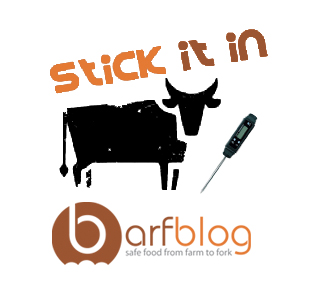Microorganisms don’t discriminate; just ask the 550 diners who got sick with norovirus at Heston Blumenthal’s fancy pants Fat Duck restaurant a few years ago.
Sarah Elton, whose new book Consumed: Food for a Finite Planet will be published in the spring, writes in the Globe and Mail there is a prevalent belief that meat in the local food system is safer than what is offered at the supermarket. I thought this too, long before the XL Foods recall, and while researching my book, Locavore, about the local food movement’s alternatives to the industrial food system in Canada, I became more familiar with the differences. I am willing  to pay more for locally-raised meat because it’s better for the environment, supports local economies, and is safer from the nasty bugs of industrial food such as E. coli O157 and antibiotic-resistant pathogens – or so I thought. The other day, as I was preparing grass-fed beef for dinner, I took a second look at what I was cooking. I realized I had assumed that this beef was safer – but was it really?
to pay more for locally-raised meat because it’s better for the environment, supports local economies, and is safer from the nasty bugs of industrial food such as E. coli O157 and antibiotic-resistant pathogens – or so I thought. The other day, as I was preparing grass-fed beef for dinner, I took a second look at what I was cooking. I realized I had assumed that this beef was safer – but was it really?
It turns out that buying a safer meat is more complicated than simply choosing local, organic, naturally raised or grass-fed. In fact, none of these labels is guaranteed to be safer.
“Bacteria really don’t care about our politics,” said Douglas Powell, a food scientist at Kansas State University who has been studying E. coli O157 for two decades. “There are risks in all food systems.” As a study out of Purdue University that compared regular beef to grass-fed concludes, “there are no clear food safety advantages to grass-fed beef products over conventional beef products.”
All cows can potentially carry toxic E. coli – as can wild deer and even raccoon. Meat is most likely to be contaminated when the carcass is gutted; animal hides can carry, and spread, the bacteria.
“Almost all food decisions are faith-based,” Powell said. “That’s why people say things like ‘I trust my farmer.’ Faith-based food systems have to go.” He wants companies to provide the consumer with food safety data.
As for me, I’ll continue to buy meat raised without antibiotics, by farmers practising low-impact agriculture. I will also, however, buy a tip-sensitive meat thermometer. I’d rather be safe than sorry.
